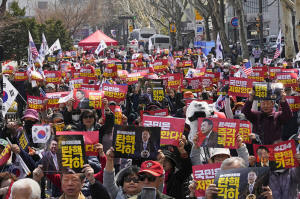South Korea’s Constitutional Court will rule Friday on Yoon's
impeachment
[April 01, 2025]
By HYUNG-JIN KIM
SEOUL, South Korea (AP) — South Korea’s Constitutional Court will rule
Friday on whether to formally dismiss or reinstate impeached President
Yoon Suk Yeol — a decision that either way will likely deepen domestic
divisions.
The court has been deliberating on Yoon's political fate after the
conservative leader was impeached in December by the National Assembly,
which is controlled by the liberal opposition, over his brief imposition
of martial law that triggered a massive political crisis.
Millions of people have rallied around the country to support or
denounce Yoon. Police said they’ll mobilize all available personnel to
preserve order and respond to possible acts of vandalism, arson and
assault before and after the court's ruling.
The Constitutional Court said in a brief statement Tuesday that it would
issue its ruling at 11 a.m. Friday and allow TV stations to broadcast it
live.
Removing Yoon from office requires support from at least six of the
court's eight justices. If the court rules against Yoon, South Korea
must hold an election within two months for a new president. If the
court overturns his impeachment, Yoon would immediately return to his
presidential duties.
Jo Seung-lae, a spokesperson for the main liberal opposition Democratic
Party which led Yoon's impeachment, called for the court to “demonstrate
its firm resolve” to uphold the constitutional order by dismissing Yoon.
Kwon Youngse, leader of Yoon’s People Power Party, urged the court’s
justices to “consider the national interest” and produce a decision that
is “strictly neutral and fair.”

Many observers earlier predicted the court’s verdict would come in
mid-March based on the timing of its rulings in past presidential
impeachments. The court hasn’t explained why it takes longer time for
Yoon's case, sparking rampant speculation on his political fate.
At the heart of the matter is Yoon’s deployment of hundreds of troops
and police officers to the National Assembly after imposing martial law
on Dec. 3. Yoon has insisted that he aimed to maintain order, but some
military and military officials testified Yoon ordered them to drag out
lawmakers to frustrate a floor vote on his decree and detain his
political opponents.
Yoon argues that he didn’t intend to maintain martial law for long, and
he only wanted to highlight what he called the “wickedness” of the
Democratic Party, which obstructed his agenda, impeached senior
officials and slashed his budget bill. During his martial law
announcement, he called the assembly “a den of criminals” and
“anti-state forces.”
[to top of second column]
|

Supporters of impeached South Korean President Yoon Suk Yeol stage a
rally to oppose his impeachment near the Constitutional Court in
Seoul, South Korea, Tuesday, April 1, 2025. The letters read "Yoon
Suk Yeol's immediate return and dismiss impeachment." (AP Photo/Ahn
Young-joon

By law, a president has the right to declare martial law in wartime
or other emergency situations, but the Democratic Party and its
supporters say South Korea wasn’t in such a situation.
The impeachment motion accused Yoon of suppressing National Assembly
activities, attempting to detain politicians and others and
undermining peace in violation of the constitution and other laws.
Yoon has said he had no intention of disrupting National Assembly
operations and detaining anyone.
Martial law lasted only six hours because lawmakers managed to enter
the assembly building and voted to strike down his decree
unanimously. No violence erupted, but live TV footage showing armed
soldiers arriving at the assembly invoked painful memories of past
military-backed dictatorships in South Korea. It was the first time
for South Korea to be placed under martial law since 1980.
Earlier public surveys showed a majority of South Koreans supported
Yoon’s impeachment. But after his impeachment, pro-Yoon rallies have
grown sharply, with many conservatives fed up with what they call
the Democratic Party’s excessive offensive on the already embattled
Yoon administration.
In addition to the Constitutional Court’s ruling on his impeachment,
Yoon was arrested and indicted in January on criminal rebellion
charges.Yoon was released from prison March 8, after a Seoul
district court cancelled his arrest and allowed him to stand his
criminal trial without being detained.
Ten senior military and police officials have also been arrested and
indicted over their roles in the martial law enactment.
__
Associated Press writer Kim Tong-hyung contributed to this report.
All contents © copyright 2025 Associated Press. All rights reserved
 |